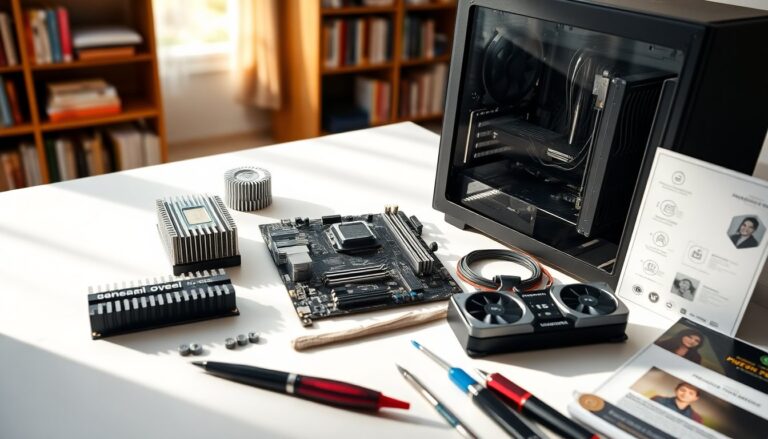Argomenti trattati
Constructing a gaming PC on a budget can be an exciting endeavor, enabling gamers to experience contemporary titles without financial strain. While many enthusiasts gravitate towards high-end systems, it is essential to recognize that a carefully built low-cost gaming PC can offer commendable performance for both casual and competitive players alike. This article delves into crucial components, performance expectations, and common inquiries to guide you through assembling an economical gaming rig.
Understanding gaming needs and performance
When discussing gaming, it is vital to acknowledge the difference between casual gaming and competitive gaming. Casual gaming typically involves less demanding titles, such as indie games or older releases, which do not require extensive hardware resources. A budget gaming PC can handle these types of games efficiently, especially when tweaked for optimal settings.
Casual gaming requirements
For those who favor a laid-back gaming experience, affordability and accessibility are often more critical than top-tier performance. By selecting the right components, you can achieve a satisfactory experience at a resolution of 1080p, allowing for smooth gameplay without overly compromising on graphics quality.
Crafting a competitive gaming setup
For players engaged in competitive gaming, where titles like first-person shooters and battle royale games reign supreme, the focus shifts to achieving high frame rates and quick responsiveness. A budget-friendly gaming PC can cater to these needs by emphasizing a balanced combination of a capable CPU and GPU.
Performance expectations
Reaching a stable frame rate of 60 FPS or more is paramount for competitive gamers. Fortunately, a selection of budget components can provide the necessary performance for popular eSports titles, granted that in-game settings are optimized accordingly.
Versatility beyond gaming
A low-cost gaming PC can also serve as a reliable productivity machine, handling tasks such as web browsing, document editing, and media consumption with ease. These everyday workloads place less strain on your system, making them well-suited for budget configurations.
With adequate RAM and a dependable storage solution, your gaming rig can effortlessly manage multitasking and routine computing tasks without noticeable lag.
Key components for a budget gaming PC
The CPU, often referred to as the brain of your computer, is crucial in executing instructions and managing tasks. When selecting a processor for a low-budget gaming PC, aim for one with a solid balance between cost and performance. A processor featuring at least four cores and eight threads is recommended for effective multitasking and gaming.
The GPU often stands as the most critical element for gaming performance. A budget-friendly graphics card should efficiently handle modern games at 1080p with medium to high settings. It is wise to choose graphics cards with at least 4GB of VRAM to ensure a smooth gaming experience.
In terms of RAM, a minimum of 8GB is advisable, although 16GB is preferable for seamless gameplay in contemporary titles. Storage options typically include traditional hard drives (HDDs) and solid-state drives (SSDs). While HDDs tend to be cheaper, SSDs provide quicker load times and enhance overall system responsiveness. An ideal setup might involve a smaller SSD for your operating system and games, complemented by a larger HDD for additional storage needs.
Building and upgrading your budget rig
When discussing gaming, it is vital to acknowledge the difference between casual gaming and competitive gaming. Casual gaming typically involves less demanding titles, such as indie games or older releases, which do not require extensive hardware resources. A budget gaming PC can handle these types of games efficiently, especially when tweaked for optimal settings.0
When discussing gaming, it is vital to acknowledge the difference between casual gaming and competitive gaming. Casual gaming typically involves less demanding titles, such as indie games or older releases, which do not require extensive hardware resources. A budget gaming PC can handle these types of games efficiently, especially when tweaked for optimal settings.1
When discussing gaming, it is vital to acknowledge the difference between casual gaming and competitive gaming. Casual gaming typically involves less demanding titles, such as indie games or older releases, which do not require extensive hardware resources. A budget gaming PC can handle these types of games efficiently, especially when tweaked for optimal settings.2
Future-proofing your gaming PC
When discussing gaming, it is vital to acknowledge the difference between casual gaming and competitive gaming. Casual gaming typically involves less demanding titles, such as indie games or older releases, which do not require extensive hardware resources. A budget gaming PC can handle these types of games efficiently, especially when tweaked for optimal settings.3
When discussing gaming, it is vital to acknowledge the difference between casual gaming and competitive gaming. Casual gaming typically involves less demanding titles, such as indie games or older releases, which do not require extensive hardware resources. A budget gaming PC can handle these types of games efficiently, especially when tweaked for optimal settings.4

